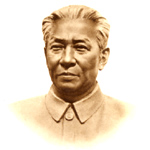
Liu Shaoqi

Liu Shaoqi
Written: September 26, 1926
First Published: The Workers' Road, No. 412 (1926)
Source: Selected Works of Liu Shaoqi, Volume 1
Online Version: Liu Shaoqi Internet Archive, April 2002
Transcribed/HTML Markup: Roland Ferguson
For the Chinese national revolution to succeed, the participation of the masses of all classes and the building of a united front of all classes are necessary. But among the classes taking part in the national revolution, the working class and the peasantry constitute the main force. As the political party which has taken on responsibility for the national revolution, the Chinese Kuomintang must on no account neglect this main force. If the Chinese national revolution is to succeed, there must be a specific worker and peasant policy conducive to the development of the worker and peasant movement.
The reason why Dr. Sun Yat-sen did not succeed in his revolution despite forty years of endeavour is that he failed to win the active participation of the worker and peasant masses who constitute the great majority of the Chinese nation. It was only after its reorganization that the Kuomintang adopted a positive worker and peasant policy, formulated a programme of political struggle for the interests of the workers and peasants, accepted Communist Party members into its ranks and led the great majority of the workers and peasants onto the path of revolution. And only after these steps were taken did the forces of the national revolution grow stronger and consolidated with each passing day.
Mr. Liao understood clearly that the Kuomintang should not regard the workers and peasants in the same way as it does the other classes in society. The worker and peasant policy, formulated personally by Dr. Sun Yat-sen, has actively assisted the growth of the worker and peasant organizations and helped to mobilize the worker and peasant masses for the national revolution. This has produced the tremendous result of unifying Guangdong Province and consolidating the foundation of the national revolution. For, to draw into the revolution the great majority of the worker and peasant masses who will fight for it with all their might, the revolution must reflect their vital interests. The workers and peasants are not to be tricked into joining the revolution. If we genuinely fight for their interests, continually help to improve their conditions and earnestly work for their emancipation, we will naturally win their enthusiastic participation in the revolution. With their participation the success of the revolution will certainly not be far off. Mr. Liao was the first person to implement a worker and peasant policy. He took an active part in promoting the worker and peasant movements and persevered despite many difficulties and much calumny. Mr. Liao had a true understanding of the process of China's national revolution and of the workers' and peasants' part in it. Hence his greatness and exemplary role for all Kuomintang members!
In implementing the worker and peasant policy, Mr. Liao shared vital interests with the workers and peasants. The reactionaries had to hire an assassin to kill him because they considered his very existence dangerous to their interests. For the workers and the peasants, the loss of Mr. Liao was their own loss.
On the anniversary of his death, it is fitting that they should honour his memory and strive to complete the task, which he left unfinished: the task of their own emancipation. For this cause Mr. Liao laid down his life! This cause makes him immortal!
[A] In the original transcription of this work, the Editorial Committee on Party Literature (Central Committee of the Communist Party of China) opted to separate editorial and explanatory notes into two separate categories, independently numbered relative to (1) the type of note and (2) chronological appearance in the text.
Both editorial and explanatory notes are presented in the present transcription in chronological order based solely on the current order of relevance to the selected text.
Additionally, the Pinyin (Chinese phonetic alphabet) spellings of Chinese proper names are used exclusively throughout the present transcription to preserve the continuity of the original transcription.
1. Written in memory of Liao Zhongkai on the first anniversary of his death. The article first appeared in the journal The Workers' Road , No. 412, sponsored by the Guangzhou-Hongkong Strike Committee.